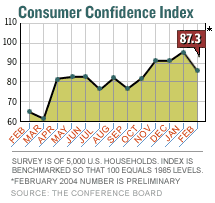NEW YORK (CNN/Money) -
Consumer confidence sank in February to its lowest level since last fall, hurt by persistent weakness in the job market, a research group said Tuesday.
The number came in well below forecasts on Wall Street.

The Conference Board, a business research group based in New York, said its closely watched index of consumer confidence fell to 87.3 from a revised 96.4 in January. It was the lowest level since 81.7 in October 2003.
Economists had expected the confidence index, based on a survey of 5,000 households, to fall to 92 from the originally reported 96.8, according to Briefing.com.
"The most important factor [in this survey] is labor market, labor market, labor market," said Anthony Chan, chief economist at Banc One Investment Advisors, who had one of the lowest forecasts for Tuesday's number on Wall Street.
"That's still not up to par, still not what people expected at this point in the recovery," Chan said.
The survey's "expectations" index, measuring consumers' expectations for the future, fell to 96.8 from a revised 107.8 in January. The "present situation" index fell to 73.1 from a revised 79.4.
On Wall Street, the report had little impact on stock prices, which moved off their lows but were little changed in late morning trading. Treasury bond prices continued to rise.
Many on Wall Street were expecting a fairly gloomy report, given the results of earlier confidence surveys by the University of Michigan, ABC and Money magazine, and Investors Business Daily.
Spending doesn't always match sentiment
Confidence is watched closely by policy makers and analysts, since consumer spending fuels more than two-thirds of the nation's economy. Many economists believe consumer spending will stay healthy in the first half of the year, buoyed by larger-than-usual income-tax refund checks, a residual effect of last year's tax cuts.
| Related stories
|

|
|
|
|
And consumers don't always spend the way they feel. Confidence plunged after the Sept. 11, 2001, terror attacks, for example, but consumers managed to keep spending, rushing to buy new automobiles at zero-percent financing.
But consumers' view of the labor market has been shaky for some time and worsened a bit in February, according to Tuesday's Conference Board data. The percentage of survey respondents saying jobs are "hard to get" rose to 32.1 percent from a revised 31.6 percent in January, near the highest level in a decade.
Some economists believe the presidential election campaign, which for the past several months has featured several Democrats complaining of weak job growth, has affected consumer sentiment.
Jobs recovery has been sluggish
But there's little doubt that the job market has actually been weaker than it usually is during an economic recovery -- although the economy has grown for nine straight quarters since the 2001 recession, the country has lost 2.3 million payroll jobs since when the recession began in March 2001.
Payrolls have expanded in recent months, but at a far more anemic pace than usual in an economic recovery, undermined by a combination of big gains in productivity, lingering business caution and a move toward shipping jobs overseas.
The outsourcing issue is still mainly a manufacturing story, as it has been for several decades, but a growing number of white-collar jobs such as software programming are moving overseas, too, generating a lot of media coverage and raising worker anxiety throughout the economy.
"One good jobs report could change everything," said Joel Naroff, president of Naroff Economic Advisors. "But we have been waiting for that for a while now, and there is no certainty when we will finally get it."
On March 5, the Labor Department is scheduled to release its report on February's unemployment rate and growth in non-farm payrolls. Economists, on average, think 125,000 jobs were created in February, according to Briefing.com.
Such job growth would make February one of the best months in years, but would still not be enough to keep up with average monthly growth of the labor force of about 150,000 people.
If job growth continues to be sluggish, and if consumers start to reign in their spending because of it, fast growth in the broader economy could be difficult to attain, especially in the second half of the year, when the tax refund effects fade.
"That's not to say consumer spending will collapse, but there's no doubt it will lag growth in the rest of the economy," said Chan of Banc One. "I'm hoping [business] capital investment will take up some of the slack."

|

